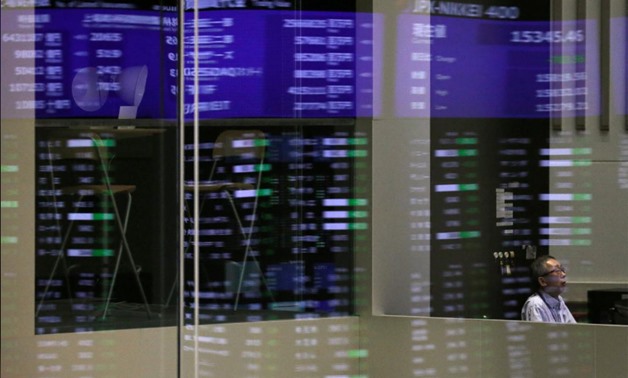
Market prices are reflected in a glass window at the Tokyo Stock Exchange (TSE) in Tokyo, Japan, February 6, 2018. REUTERS/Toru Hanai
TOKYO - 23 October 2018: Asian shares slumped on Tuesday as a cocktail of negative drivers from Saudi Arabia’s diplomatic isolation to fresh worries about trade wars whacked sentiment across the region.
Selling in Asia erased gains made in rally of the previous two sessions, which were led by China stimulus hopes, with the MSCI’s broadest index of Asia-Pacific shares outside Japan dropping 2.2 percent. Declines in many regional benchmark indexes also exceeded 2 percent.
European shares are likely to come under pressure with France’s CAC and Germany’s DAX set to pierce their 2018 lows. Spread-betters see CAC falling 0.6 percent and Dax 0.9 percent. Britain’s FTSE is seen falling 0.5 percent.
South Korea’s Kospi and Hong Kong’s Hang Seng both fell 3 percent while Japan’s Nikkei lost 2.7 percent. MSCI’s index for the region including Japan hit the lowest level since May 2017.
“We’ve got a few negative factors when market sentiment was already fragile,” said Hiroyuki Ueno, senior strategist at Sumitomo Mitsui Trust Asset Management. “And earnings from some Japanese companies were weaker than expected, with some starting to blame trade wars.”
U.S. stock futures dropped 1.0 percent in Asia. On Monday, the S&P 500 lost 0.43 percent as investors kept a wary eye on earnings amid global growth worries. Enthusiasm over some upbeat results was tempered by the growing political uncertainty around the world.
“In short, the world seems to be getting into chaos,” said Akira Takei, bond fund manager at Asset Management One.
U.S. President Donald Trump said on Monday he was not satisfied with what he had heard from Saudi Arabia about the killing of journalist Jamal Khashoggi at its consulate in Turkey, but expressed reluctance to punish the kingdom economically.
While Saudi Arabia has sought to shield its powerful crown prince from the killing, many officials have cast doubt on Riyadh’s narrative.
Several countries, including Germany, Britain, France and Turkey, have pressed Saudi Arabia to provide all the facts.
An immediate market focus is on Turkish President Tayyip Erdogan, who said he will release information about the investigation in a speech on Tuesday.
Any signs of instability in Saudi Arabia, a major oil producer and a big investor in financial markets, could have wide-ranging repercussions.
“Saudi Arabia is involved with many big investment projects. Now we could see some of them held up because of this,” an executive at a Japanese asset management firm.
In Europe, Italy told the European Commission on Monday it would stick to its contested 2019 budget plans in defiance of EU fiscal rules.
The European Commision will decide on its response on Tuesday.
The euro slipped 0.2 percent to $1.1440, edging near its Oct. 9 low of $1.14325, its lowest level since mid-August.
Although Italian bond prices rose on relief after Moody’s did not slap on a negative outlook as the market had feared, yields remained elevated, with 10-year bonds rates more than 3 percentage points above benchmark German bonds.
The British pound lost 0.2 percent to $1.2940, hovering just above this month’s low of $1.2922 on fears the Irish border issue and disagreements within Britain’s ruling Conservatives over Brexit could see Prime Minister Theresa May face a serious leadership challenge.
The yen gained 0.4 percent on risk-off mood to 112.42 to the dollar.
The yuan was little changed but stood near Monday’s 21-month low of 6.9445 per dollar in the onshore trade on expectations China will pursue looser monetary policy to cope with pressure from U.S. President Donald Trump on tariffs.
Chinese shares also lost steam after two days of strong gains following guidance from Chinese officials, including Vice Premier Liu He, to major investors to support the sagging stock market.
“Any stimulus by China should be viewed not as a boost but as a cushion against a slowing economy against external headwinds,” said analysts at DBS in Singapore. “This reality was better reflected in the Chinese yuan which continued to trade weaker against the central parity in both the onshore and offshore markets.”
Oil prices fell after Saudi Arabia pledged to play a “responsible role” in energy markets, although sentiment remained nervous in the run-up to U.S. sanctions against Iran’s crude exports that start next month.
Saudi Arabia has pledged to keep markets supplied despite its increasing isolation over Khashoggi’s killing, easing fears Riyadh may use oil production as a diplomatic weapon.
Front-month Brent crude oil futures were at $79.51 a barrel, down 0.4 percent.
U.S. West Texas Intermediate (WTI) crude futures were at $69.12 a barrel, dropping 0.35 percent.


Comments
Leave a Comment